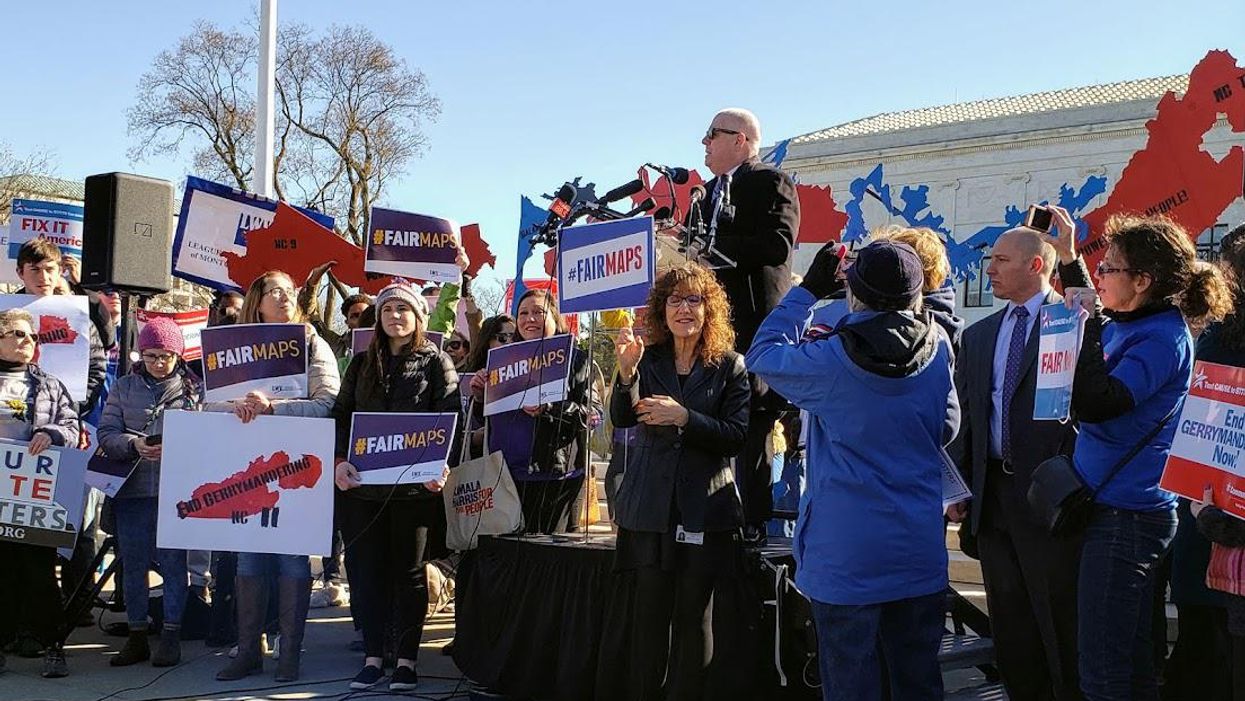Gorrell is an advocate for the deaf, a former Republican Party election statistician, and a longtime congressional aide. He has been advocating against partisan gerrymandering for four decades.
The For the People Act “would help end voter suppression in states, get dark money out of politics, give voice to people, create fair district maps and end partisan political gerrymandering,” President Biden said at the historic National Constitution Center in Philadelphia, the birthplace of American democracy, in July 2021.
Six months later, Biden spoke about that bill’s successor, the Freedom to Vote Act, on the grounds at Morehouse College and Clark Atlanta University: “It would get dark money out of politics, create fairer district maps, and ending partisan gerrymandering.”
Last Thursday, the House combined the Freedom to Vote Act and the John R. Lewis Voting Rights Advancement Act into a 735-page megabill. The Senate is beginning debate on the Freedom to Vote: John R. Lewis Act this week.
If this bill passes, its supporters claim, it will end partisan gerrymandering for congressional districts by setting a national standard for determining if a map is gerrymandered to favor one party.
Nevertheless, that's just not true.
While the bill would give the Justice Department, private citizens and political parties, among others, the ability to bring lawsuits challenging congressional maps, they would only be able to do so in one court, which is located in heavily Democratic Washington, D.C.
Currently, the venue for partisan redistricting cases is not addressed explicitly in federal law. A three-judge panel hears cases, and appeals bypass circuit courts and go directly to the Supreme Court.
However, in a 2019 decision on the North Carolina redistricting case, Rucho v. Common Cause, the Supreme Court decided that partisan gerrymandering was not an issue for federal courts. Chief Justice John Roberts laid the responsibility for judging a gerrymandered map at the feet of state courts. Since then, Democrats and Republicans have filed lawsuits in at least nine state courts in the last several months, challenging congressional or legislative district lines.
Language in the Freedom to Vote: John R. Lewis Act states that all partisan gerrymandering claims would have to be brought in the U.S. District Court for the District of Columbia (not your local federal district court) — creating a sort of specialty court that can serve as a rapid-response traffic cop on congressional maps. A decision would be reviewable on appeal, but only by the U.S. Court of Appeals for the District of Columbia Circuit (the most liberal circuit in the country). Then a decision by the Court of Appeals could be reviewed by the Supreme Court.
The D.C. Circuit judges have swayed over time between a Republican- and Democratic-appointed majority. The court currently consists of a chief judge and three others appointed by former Barack Obama, one George H. W. Bush, two by Bill Clinton, three by Donald Trump and two appointed by Biden. As of now, the final count is eight Democratic-appointed judges and four Republican-appointed judges.
A three-judge panel would hear partisan gerrymandering cases. It could be “Democratic partisan gerrymandering” only when two or three Democratic-appointed judges sit. However, it could be “Republican partisan gerrymandering” when Republicans secure a hypothetical GOP trifecta in 2024.
Wait! What about the creation of an independent redistricting commission? The For the People Act would have required states to establish a bipartisan independent commission to redraw their congressional districts every 10 years. However, the Freedom to Vote: John R. Lewis Act would not require nonpartisan redistricting commissions (just that states adhere to nonpartisan mapping criteria).
The solution? If the bill fails, as expected, the best alternative to end the 210-year-long partisan gerrymandering problem could be a bill previously offered by California Democratic Rep. Zoe Lofgren. She should reintroduce her redistricting reform bill, for a ninth time, as a stand-alone measure. In 2021, Lofgren essentially folded her bill into the doomed For The People Act. During the eight previous Congresses, it died in committee and gained relatively few cosponsors until after Trump’s election in 2016.
It is time for Rep. Lofgren to release her unorthodox weapon, one we need to defend democracy.
======
Writer: Gorrell is an advocate for the Deaf, a former Republican Party election statistician, and a longtime congressional aide. He has been advocating against partisan gerrymandering for four decades.
Maryland Governor Larry Hogan at a rally for Fair Maps in front of the U.S. Supreme Court in 2019. Photo by Howard Gorrell.
Former California Governor Arnold Schwarzenegger at a rally for Fair Maps in front of the U.S. Supreme Court in 2019. Photo by Howard Gorrell.




















